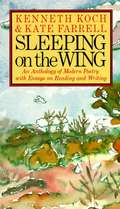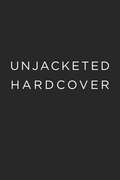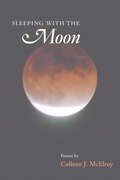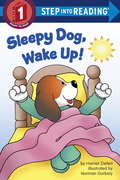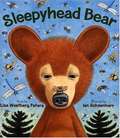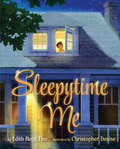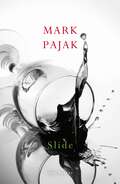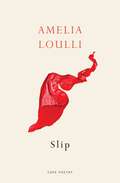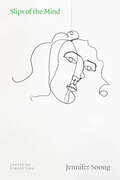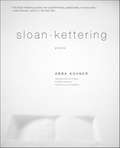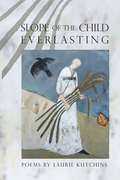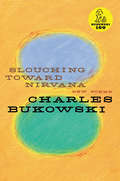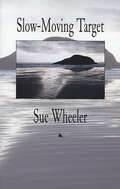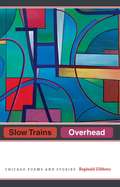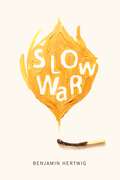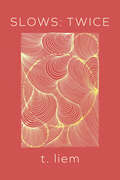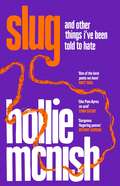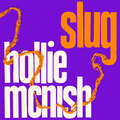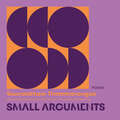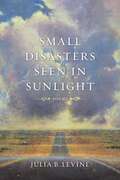- Table View
- List View
Sleeping on the Wing: An Anthology of Modern Poetry with Essays on Reading and Writing
by Kenneth Koch Kate FarrellSelections from the work of twenty-three modern poets, from Emily Dickinson and Gerard Manley Hopkins to Gary Snyder and Leroi Jones, including translations of poems by five European poets.
Sleeping with the Dictionary (New California Poetry #4)
by Harryette MullenPart of the award-winning New California Poetry Series, Sleeping with the Dictionary is the fifth volume of poetry by Harryette Mullen, a well-respected African American poet.
Sleeping with the Moon (Illinois Poetry Series)
by Colleen J. McElroyPEN Oakland National Literary Award, 2008 Colleen J. McElroy's poetry shoots for the moon, and takes it in, too, in one way after another. The collection’s award-winning poems animate women’s experiences of sex, shopping, and dancing, while offering telling insight into the struggles and silver lining of lust, love, illness, and aging. Rich with vivid imagery and candid storytelling, Sleeping with the Moon takes readers on moonlit adventures under the night sky, through the barroom’s smoky haze, and under the covers. ...Beware: such delicate sights have driven more than one woman to despair instead she watched him breathe-- relishing for a moment that secret space where night grows soft and the moon’s detumescence forgives-- and where if this jeweled light holds they might strip themselves of years if only for one night --from “In Praise of Older Women”
Sleepy Dog, Wake Up! (Step into Reading)
by Harriet Ziefert Norman GorbatyThe bestselling Sleepy Dog now has a sequel! In this Step 1 Step into Reading Reader, Sleepy Dog does not want to wake up! The sun is up, the cat is up--wake up, Sleepy Dog! Every sleepy child will laugh with Sleepy Dog as he shakes off his snooziness and finally gets out of bed, all ready to play. Fans of the original Sleepy Dog will be excited to join in Sleepy Dog's fun morning. Step 1 Readers feature big type and easy words for children who know the alphabet and are eager to begin reading. Rhyme and rhythmic text paired with picture clues help children decode the story.
Sleepyhead Bear
by Lisa Westberg PetersAges 4 up It is a hot summer day, and Bear's eyes are droopy. But . . . BZZZZZZZZZZZZZZZZZZ pesky bugs are buzzing here and there and everywhere. What is a sleepy little bear to do? He could try a growl. GRRRRRR! He could try a roar. ROAR! He could try swimming and climbing and hiding and running . . . oh, dear! It's a hot summer day, and now Bear really needs a rest. Help!
Sleepytime Me
by Edith Hope Fine Christopher DeniseSplashy sunset paints the sky. Shy moon tiptoes, climbs up high . . . Daylight is fading and night is drawing in. It's time for bed. A drowsy child observes the wide world settling down, coming ever closer to home until at last there are good-night hugs and kisses for this little sleepyhead. Richly painted, evocative scenes illuminate the text, imbuing the whole with mystery and a sense of comfort and warmth, and making this a bedtime story to treasure for all time.From the Hardcover edition.
Slide
by Mark Pajak**SHORTLISTED FOR THE T. S. ELIOT PRIZE****SHORTLISTED FOR THE SEAMUS HEANEY FIRST COLLECTION PRIZE**'Fresh, urgent, alive... genius' PATIENCE AGBABIThis assured and arresting first collection moves deftly and with purpose into private, hidden places - a locked shed, the dark of a battery farm, a murky riverbed, a late-night bar - to show, unflinchingly and in cinematic detail, what we might otherwise choose not to see. Sight is both a gift and curse, of course: given or taken away in poems of windows and curtains, torches and blindfolds, and yet here - following in the tradition of Oswald and Heaney - each image is freshly minted through a cool, objective eye.Every poem seeks to inhabit those seemingly small but pivotal moments which have monumental, sometimes mortal, consequences. For Pajak, time is fluid: a blink can be 'slow as an eclipse', our lifetimes are fleeting, our deaths often lingering and seldom peaceful or painless.Vivid and visceral, steadily examining violence, sexual encounters, childhood and ageing (a dying grandmother's 'slow pink eyelids, those quick teaspoon breaths'), cars and cities, and Nature - full of wonder and threat - Slide is always asking pertinent questions: illuminating brutality, frailty and tenderness, the responsibility of those who witness - whether voyeur, bystander or reader. This is a charged, beautifully observed and thrilling debut.
Slip: From the Winner of the Northern Writers’ Award
by Amelia LoulliOne in three women in Britain have an abortion. For such a common procedure, it has not been the subject of a dedicated book of poetry - not, at least, until now.'Painful, brave and steadfastly honest' ANDREW MCMILLAN'Original, essential... An unforgettable collection' FIONA BENSONAmelia Loulli opens this fearless, frank, absorbing debut with the words 'I'm going to tell you what happened', and that is precisely what she does. With these careful, generous, insistent poems, we are led through the experience of abortion and surprised at every turn. There is vulnerability and despair, there is the shame and silence too, but there is also the constant, steady pulse of compassion, tenderness and wonder at the world.Slip is a daring book, not just in subject but in style: skilfully worked, integrating the rich terror of nursery rhymes and folk tales with the bland banalities and euphemisms of social interaction, of medical techniques. It is also, sadly, a necessary book - provocative and transformative poetry about women as mothers and survivors. A cry of fury and a cry of love.
Slips of the Mind: Poetry as Forgetting (Thinking Literature)
by Jennifer SoongAn audacious account of what happens when forgetting becomes a way of writing and writing becomes a way of forgetting. In Slips of the Mind, poet and critic Jennifer Soong turns away from forgetting’s long-standing associations with suppression, privation, and error to argue that the absence or failure of memory has often functioned as a generative creative principle. Exploring forgetting not as the mere rejection of a literary past or a form of negative poetics, Soong puts to the test its very aesthetic meaning. What new structures, forms of desires, styles, and long and short feelings do lapses in time allow? What is oblivion’s relationship to composition? And how does the twentieth-century poet come to figure as the quintessential embodiment of such questions? Soong uncovers forgetting’s influence on Gertrude Stein, Lyn Hejinian, Tan Lin, Harryette Mullen, Lissa Wolsak, and New York School poets John Ashbery, James Schuyler, Bernadette Mayer, and Ted Berrigan, among others. She reveals that forgetting’s shapeshifting produces differences in poetic genre, interest, and degrees of intentionality—and that such malleability is part of forgetting’s nature. Most provocatively, Soong shows how losing track of things, leaving them behind, or finding them already gone resists overdetermination and causality in the name of surprise, as poets leverage forgetting in order to replace identity with style. Slips of the Mind is the kind of literary criticism that will reward all readers of modern and contemporary poetry.
Sloan-Kettering
by Abba KovnerIn his final collection of poems, Abba Kovner -- the famed Jewish resistance fighter who led the Vilna ghetto uprising during World War II -- records his battle with cancer and his deep engagement with life up to his last days. A beloved master of Hebrew literature, Abba Kovner was a poet, novelist, and essayist whose work has seldom appeared in English. These clear, spare, luminous verses bring his voice to us in all its fullness. Facing the one fight he knew he would lose, Kovner records in these poems his final weeks, as he was dying of cancer at Memorial Sloan-Kettering in New York. Weaving together his perceptions of the present moment ("How little we need to be happy: a half kilo increase in weight, /two circuits of the corridors"), sorrow at leaving the world and at the dramatic loss of his vocal chords ("Have I no right to die/while still alive?"), and memories of his heroic comrades in the Baltic forest, Kovner emerges from these pages with yet another kind of heroism. His desire to give a complete account of the gift of life, even as that life is failing, makes these poems deeply moving and unforgettable.
Slope of the Child Everlasting (American Poets Continuum)
by Laurie KutchinsSlope of the Child Everlasting sustains the lyric and imagistic sensibility of Laurie Kutchins’ previous poetry collection, The Night Path (BOA Editions, 1997), while expanding on its exploration of the archetypes that anchor the heart and mind of her poetry. The characters in these poems evoke chaos and regression, as well as song, wonder, and the tenacity of the imagination. Laurie Kutchins is an associate professor of English at James Madison University in Virginia. She lives in Harrisonburg, Virginia, and spends her summers along the Wyoming-Idaho border. The Night Path won the 1997 Isabella Gardner Award from BOA Editions.
Slouching Toward Nirvana: New Poems
by Charles Bukowskiin this place there are the dead, the deadly and the dying. there is the cross, the builders of the cross and the burners of the cross. the pattern of my life forms like a cheap shadow on the wall before me. my love what is left of it now must crawl to wherever it can crawl. the strongest know that death is final and the happiest are those gifted with the shortest journey.
Slovenly Love
by Méira CookLonglisted for the 2004 ReLit Awards Slovenly Love is Meira Cook's third book of poetry. A Fine Grammar of Bones and Toward a Catalogue of Falling, both collections of lyrics, are now joined by a fascinating long poem composed of five sequences. Slovenly Love, in its exhilarating renovation of words and forms, gorgeously confirms that.
Slow Lightning
by Eduardo C. CorralSeamlessly braiding English and Spanish, Corral’s poems hurtle across literary and linguistic borders toward a lyricism that slows down experience. He employs a range of forms and phrasing, bringing the vivid particulars of his experiences as a Chicano and gay man to the page. Although Corral’s topics are decidedly sobering, contest judge Carl Phillips observes, “one of the more surprising possibilities offered in these poems is joy.”
Slow Moving Target
by Sue WheelerShortlisted for the 2001 Pat Lowther Award and the 2001 Dorothy Livesay Award for Poetry (BC Book Prizes) In her second book, Slow-Moving Target, Sue Wheeler unwraps more than the Fifties. She unwraps a whole shopful of environments and events, and winds them up and sets them down to delight her readers. There is no sentimentalizing here -- either of people or of other places and times -- and yet the writing is so consistently sharp, perceptive, and clear, that the overall direction is always towards hope, towards the light.
Slow Trains Overhead: Chicago Poems and Stories
by Reginald GibbonsFew people writing today could successfully combine an intimate knowledge of Chicago with a poet's eye, and capture what it's really like to live in this remarkable city. Embracing a striking variety of human experience--a chance encounter with a veteran on Belmont Avenue, the grimy majesty of the downtown El tracks, domestic violence in a North Side brownstone, the wide-eyed wonder of new arrivals at O'Hare, and much more--these new and selected poems and stories by Reginald Gibbons celebrate the heady mix of elation and despair that is city life. With Slow Trains Overhead, he has rendered a living portrait of Chicago as luminously detailed and powerful as those of Nelson Algren and Carl Sandburg. Gibbons takes the reader from museums and neighborhood life to tense proceedings in Juvenile Court, from comically noir-tinged scenes at a store on Clark Street to midnight immigrants at a gas station on Western Avenue, and from a child's piggybank to nature in urban spaces. For Gibbons, the city's people, places, and historical reverberations are a compelling human array of the everyday and the extraordinary, of poverty and beauty, of the experience of being one among many. Penned by one of its most prominent writers, Slow Trains Overhead evokes and commemorates human life in a great city.
Slow Transparency
by Rachel HadasHere is a bit of "Praise for a Patch of Quiet:" Two of the strongest silences to lean on: a white cat lying on a wooden floor waking to stretch and stretching back to sleep (cream walls, grey-painted floorboards, plain white curtains, black metronome) and out of doors where all the world's a timepiece this slope of ripening or ripened apples. Their floating tart perfumes do not insist to one whose only hunger is for quiet this afternoon; they just enrich the air, invisibly adorn one's breathing space. Spaces between first words, then conversations: the tempo slows. Rust holes at first glinted like isolate stars in the tin barn roof years have dappled since to slow transparency. I'd thought to be alone would be . . . would be . . . bees buzzed a busy swarm, each mote a menace. Would be to lose a writing hand, a face, a sounding board, a listening ear, a voice-- all lopped imaginings. WTould be and was and is this afternoon to lose the need for ticktock voicing. Silence thickens: mercury gleams afresh in the cherished tarnished mirror I tilt, across whose valuable sheen as over clean white paper half a dozen summer pencils lightly scribble: insect buzz, chainsaw, birdcall, hoot of train, pattern simple at once and multiple as are the endless changes of attention due to a single hour of cloudboats sailing across and across a shifting summer sky. ...
Slow War (The Hugh MacLennan Poetry Series #40)
by Benjamin Hertwigremember your body again / how cedar smells of god / and a Bach cantata / makes you almost / forgive / your hands.
Slows: Twice
by T. LiemCBC BOOKS CANADIAN POETRY COLLECTIONS TO WATCH FOR IN SPRING 2023Backward and forward: a double book of mirrored poems about identity in all its forms.This is a book of slow hours, days, and years—how they can collapse into one another, how it can feel like we are living one day repeating itself. From within this collapse, the speaker seeks connection everywhere. They visit their father’s birthplace, Jogjakarta; they listen to a stranger’s phone call at the Motel 6 in Alberta; they linger in the so-called ethnic aisle of the grocery store. From all of these places the speaker is discouraged but tries to imagine a future joyously incomprehensible to the present.Slows: Twice is a collection of revisions and repetitions. Every poem in one half of the book has an alternate version, or a mirror poem, in the other half. Lines, words, images, and forms are reused and reflected in a kind of palindrome, so the book can be read from front cover to back cover, or vice versa. In this way, Liem considers how language shapes identity over time and how the speaker’s position in relation to language might be revised. The poems are tied to themes of work and labor, consumption and waste, family and home, as other shapers of identity and relationships. The act of revising and repeating – slowly – is meant to be a resistance to efficiency, a resistance to being an always-productive body under capitalism."The poems of Slows: Twice collect in resonance, contemplate the construction of selves, with modes of repetition, sequencing, and mirroring, the way language assembles an identity or points to itself as it points away. 'The clouds // disappear the sky sometimes; or they become it.' Storied and cubistic, palindromic and cleaved, Liem’s poems reveal relationships to time, noise, and duration, and the possibility of joy given painful pasts." – Hoa Nguyen, author of A Thousand Times You Lose Your Treasure"T. Liem is one of my favorite poets working in Canada. I welcomed this book into my life like sudden sunlight. Slows: Twice is a book about how urgently we need to read differently. I loved its mischievous relation to form and expectation as well as its burning intelligence. I once described T. as an inheritor of the tradition of language poetry, but what Slows: Twice proves is that T. is less an inheritor and more so an innovator, an inventor in their own right. I read it in one frenzied sitting." – Billy-Ray Belcourt, author of A Minor Chorus"It’s breathtaking to watch words drip from a page into a silver river cutting through a canyon of time. T. Liem sculpts poetry with steady, curious fingers, pushing against the filaments we think hold us together that have been quietly collecting cracks, from buried violence and whispered histories to the fragile connections tying us together. Obits. captured my heart; Slows: Twice now affirms it." – Teta, founder of diasporic Indonesian publication Buah zine"'For everything I was, I am now something else.' Revision of self and world are core to this innovative, unruly book that manages somehow to be at once formally wacky and emotionally clear. These poems seem to ask: if language is a box heavy with histories and inadequacies and which we nevertheless must carry, can language also carry us somewhere, elsewhere, strangely? Rarely have I encountered a book so at home in the unresolved, in the tension between a longing for declaration and a commitment to questions. T. Liem’s work conjures the figure of Janus: god of duality and gates, one face facing an end, the other looking through a new door, right in the eye of a dream." – Chen Chen, author of Your Emergency Contact Has Experienced an Emergency<span data-sheets-value="{"1":2,"2":"\"t. liem's SLOWS: TWICE is a fascinating exercise in re
Slug: The Sunday Times Bestseller
by Hollie McNishTHE SUNDAY TIMES BESTSELLER'An intoxicating mixture of poetry and prose, Slug is a taboo-busting delight' SCOTSMAN 'One of the best poets we have' MATT HAIG 'She writes with honesty, conviction, humour and love' KAE TEMPESTThe new collection of poetry and prose from the Ted Hughes Award-winning author of Nobody Told MeFrom Finnish saunas and soppy otters to grief, grandparents and Kellogg's anti-masturbation pants, Slug is a book which holds a mirror lovingly up to the world, past and present, through Hollie's driving, funny, hopeful poetry and prose. Slug is about the human condition: of birth and death and how we manage the possibilities in between.'The inimitable words of poet/goddess Hollie McNish once again hold up honest, damn funny and refreshing takes on the everydayness of our lives . . . Never have we needed her more' STYLIST'Hollie always articulates exactly how I feel' CHARLY COX'A tribute to life itself' RED
Slug: The Sunday Times Bestseller
by Hollie McNishTHE SUNDAY TIMES BESTSELLER'An intoxicating mixture of poetry and prose, Slug is a taboo-busting delight' SCOTSMAN 'One of the best poets we have' MATT HAIG 'She writes with honesty, conviction, humour and love' KAE TEMPESTThe new collection of poetry and prose from the Ted Hughes Award-winning author of Nobody Told MeFrom Finnish saunas and soppy otters to grief, grandparents and Kellogg's anti-masturbation pants, Slug is a book which holds a mirror lovingly up to the world, past and present, through Hollie's driving, funny, hopeful poetry and prose. Slug is about the human condition: of birth and death and how we manage the possibilities in between.'The inimitable words of poet/goddess Hollie McNish once again hold up honest, damn funny and refreshing takes on the everydayness of our lives . . . Never have we needed her more' STYLIST'Hollie always articulates exactly how I feel' CHARLY COX'A tribute to life itself' RED
Slug: The Sunday Times Bestseller
by Hollie McNishListen to the audiobook for an exclusive interview with Hollie and her good friend, radio presenter Gemma Cairney. Hollie has also included a special poetry reading in memory of her grandmother, as well as an exclusive preview of poems from her next book.'One of the best poets we have' MATT HAIG'She writes with honesty, conviction, humour and love' KAE TEMPEST 'Hollie always articulates exactly how I feel' CHARLY COX The new collection of poetry and prose from the Ted Hughes Award-winning author of Nobody Told MeFrom Finnish saunas and soppy otters to grief, grandparents and Kellogg's anti-masturbation pants, Slug is a book which holds a mirror lovingly up to the world, past and present, through Hollie's driving, funny, hopeful poetry and prose. Slug is about the human condition: of birth and death and how we manage the possibilities in between.'The inimitable words of poet/goddess Hollie McNish once again hold up honest, damn funny and refreshing takes on the everydayness of our lives . . . Never have we needed her more' STYLIST
Small Arguments: Poems
by Souvankham ThammavongsaA beautiful re-issued edition of poetry from the Scotiabank Giller Prize–winning author of How To Pronounce Knife FEATURING A NEW INTRODUCTION BY THE AUTHORThe language of Small Arguments is simple, yet there is nothing simple in its ideas. Reminiscent of Pablo Neruda&’s Elemental Odes, these poems explore the structures of argument, orchestrating material around repetition, variation, and contrast. Thammavongsa&’s approach is like that of a scientist or philosopher, delicately probing material for meaning and understanding. The poet collects small lives and argues for a larger belonging: a grain of dirt, a crushed cockroach, the eyes of a dead dragonfly. It is a work that suggests we can create with what we know and with that alone.First published in 2003, Small Arguments announced the arrival of a distinct and utterly original new voice.
Small Beginnings: Things People Say About Babies
by Nanette NewmanA collection of quotes, poems and excerpts reflecting with humor, heart and cynicism, the emotions and activities surrounding the birth of babies. Read about the pitfalls of a baby's first bath, the praise expected by new mothers, blessings, lullabies, birth announcements, advice and much more. recognizable authors represented include Dylan Thomas, George Bernard Shaw, Shakespeare, Charles Dickens, Robert Burns, H. G. Wells, Henry Wadsworth Longfellow, Thomas Hardy, Ogden Nash, Mark Twain, William Wordsworth, Jane Austen, Samuel Taylor Coleridge and many others.
Small Disasters Seen in Sunlight: Poems (Barataria Poetry)
by Julia B. Levine"A polished poet of extraordinary skill.... Levine is caught between wholehearted love of the world's beauty and sorrow at its unavoidable misery and suffering." -- Library JournalWith an astonishing grasp of language and detail, Julia Levine enacts a visceral, lyric experience that slips wildly between and within tragedy and grace. In Small Disasters Seen in Sunlight, her fourth collection, Levine offers far-ranging subjects, including poems about a friend's suicide and the poet's own interactions with traumatized children, as well as a series of revision poems that question the imagination's infinite possibilities for creation. In "Strolling in Late April," a woman with dementia wanders in a park filled with springtime beauty, while in "Tahoe Wetlands," the speaker recalls a rape at gunpoint through the merciful distance of time. At times humorous, ironic, and even redemptive, these poems are infused with lush images of the natural and physical world. Levine's work pries apart small places that exist within the spaces between beauty and trauma in an ordinary life. Ultimately, the poems affirm our human resilience, made possible by the presence and help of others: "carrying something of the unbearable / between us until it could be borne."
